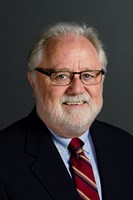

How wonderfully surprising and edifying it is when God weaves together things in our lives that otherwise would seem to have no connection. A conversation with a coworker unexpectedly reminds you of something you read in the Scripture just this morning. The application of a sermon becomes clear as you watch the evening news. A hymn underscores a scriptural truth in a way you haven’t understood before and speaks comfort in a present trial.
Recently, God made that kind of link in my mind when I read that Paul Simon is retiring. Without a doubt, he is one of America’s greatest songwriters – “Sounds of Silence,” “Bridge Over Trouble Waters,” “American Tune,” “Graceland” and too many others to mention. But in a recent New York Times interview, he said, “Showbiz doesn’t hold any interest for me.”
And if you’re a fan like I am, you’re aware that he’s going out on top with the release of the highly lauded album Stranger to Stranger, a hit single on college radio titled “Wristband,” and a five-star tour that’s on its final leg in Europe now.
I was saddened to hear the news of his retirement, but it’s understandable. After all, Simon started playing music and writing songs 61 years ago at age 13, and he’s been at it ever since.
But the connection to a book I’m reading came from another comment in the NYT interview. In contemplating his retirement, Simon said, “It’s an act of courage to let go. I am going to see what happens if I let go. Then I’m going to see, who am I? Or am I just this person that was defined by what I did? And if that’s gone, if you have to make up yourself, who are you?”
“[A]m I just this person that was defined by what I did?” That’s a soul-shaking question to me as I enter what will likely be the last quarter of my life. Let me restate the question in the context of my own life: “Dear God, how would you have me spend my last 20 to 25 years?”
Quite a question, isn’t it? But before you award me a saintly certificate, let me tell you why that question may reveal more about my pride than my piety.
You see; I am not immune to the kind of restlessness that is common in our Christian subculture and often leads Christians to measure their spiritual growth by experiences. As Michael Horton writes in his book Ordinary: Sustainable Faith in a Radical, Restless World, modern evangelicals often feel the push to do something great for God, to find the next big breakthrough, to change the world.
The result can be disillusionment and burnout, not to mention the fact that such big aspirations have no biblical warrant.
In an interview Horton said:
Many of us were raised in a Christian subculture of managed expectations, called to change ourselves or our world, with measurable results. There always had to be a cause du jour to justify our engagement. Otherwise, life in the church would simply be too ordinary. Like every other area of life, we have come to believe that growth in Christ – as individuals or as churches – can and should be programmed to generate predictable outcomes that are unrealistic and are not even justified biblically. We want big results – sooner rather than later. And we’ve forgotten that God showers his extraordinary gifts through ordinary means of grace, loves us through ordinary fellow image bearers, and sends us out into the world to love and serve others in ordinary callings.
In Ordinary, Horton writes that in our drive to fulfill our radical dreams for God – which are, more times than not, really for ourselves – other people can simply become supporting cast in the great movie of our lives. In addition, if we are honest with ourselves, chasing the big dream can be much easier than following Christ where he has placed us.
But haven’t some Christians been called to take on big works of ministry? Certainly. But for most of us … well, we’re ordinary Christians whose call is not to chase a BHAG (big, hairy, audacious goal), but to be faithful in the ordinary means of Christian growth and service. That means reading and studying the Word; loving and serving our families, neighbors, and community; being a faithful part of a local body of Christ; participating in the sacraments, and glorifying and enjoying God every day.
So, how do I plan to spend whatever time I have left on earth? By God’s grace, I pray that I’m ordinary.
Editor’s Note: Ordinary: Sustainable Faith In A Radical, Restless World by Michael Horton is published by Zondervan and available at local and online bookstores. Horton is a professor at Westminster Seminary California and the host of the White Horse Inn broadcast and podcast.

